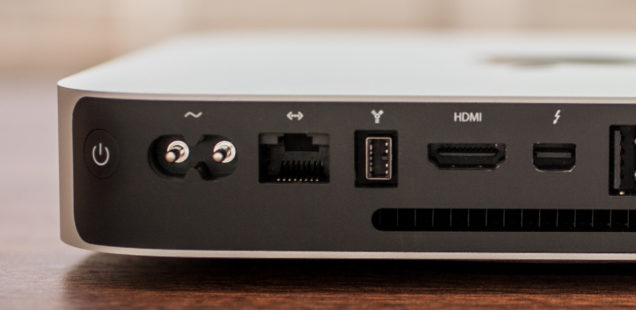
Upgrading Mac Mini (2014-2017): Installing an SSD
Apple has been using slow hard drives in Mac mini for years, so replacing them with an SSD is very worthwhile. If you have a current Mac mini without Fusion Drive, at home, the lame hard drive should be replaced by an SSD. The speed increase is enormous. In contrast to a conventional hard disk, an SSD (solid-state drive) does not have magnetic disks with a mechanical read head, but stores the data on chips. Therefore, data can be accessed almost without delay.
Unfortunately, Apple has left no room for a second 2.5-inch drive in Mac mini (built in 2014) and protects the contents with TR security screws with a security pin. However, screwdrivers are now available everywhere and thanks to detailed video instructions, the conversion can be carried out by anyone who does not have two left hands. It is only important to take your time for the installation and to proceed carefully.
Difficulty level:
Compatible SSDs – Mac mini (2014 – 2017)
[Last update: 15.04.2018]
 Notation
Notation
There are many different solid-state drives (SSDs) on the market, but some of them differ considerably in speed and durability. For this reason I have only compiled high-quality and fast SSDs, which I could test personally in my professional everyday life and therefore can recommend best conscience.
- Samsung 860 Pro Series, 2,5 Zoll, SATA III Tip
(Available sizes: 256GB / 512GB / 1TB / 2TB) - Samsung 860 EVO, 2,5 Zoll, Sata III Tip
(Available sizes: 250GB / 500GB / 1TB / 2TB / 4TB) - Samsung 850 Pro, 2,5 Zoll, SATA III
(Verfügbare Größen: 256GB / 512GB / 1TB / 2TB) - Samsung 850 EVO, 2,5 Zoll, SATA III
(Available sizes: 120GB / 250GB / 500GB / 1TB / 2TB / 4TB) - Crucial MX500, 2,5 Zoll, SATA III
(Available sizes: 250GB / 500GB / 1TB / 2TB)
Data migration
Before the built-in hard disk of Mac mini can be replaced by an SSD, we have to think about the available data and the operating system. The data and settings should of course be saved. There are two different procedures.
Option 1: Clone hard disk to SSD
- Before making a backup using a TimeMachine, a backup is always available in an emergency.
- Connect the SSD to the Mac Mini via USB (e.g. using an SATA to USB3.0 adapter)
- The new SSD must now be formatted for the first time using the hard disk utility (as”Mac OS Extended Journaled“)
- Then Carbon Copy Cloner or SuperDuper! can be used to create a fully bootable 1:1 copy of the hard disk on the SSD (this process can take several hours).
Option 2: Reinstall OS X and restore the backup
- Create a backup with TimeMachine before a modification for the later data restore.
- Create bootable OSX-Recoverystick (instruction)
- Now the new SSD must be installed in the Mac Mini (see installation for instructions)
- After the SSD is installed, plug in the USB stick. Then, press and hold the ALT key to turn on the Mac Mini.
- You will now be asked from which medium to boot. Select the USB stick here.
- Before reinstalling, format the SSD using the disk utility (as “Mac OS Extendet Journaled“). After that OS X can be installed on the new SSD. Just follow the instructions on the screen.
- In the last step, the data and settings are now restored from the TimeMachine backup.
Installation
Once all the backups have been completed, we can proceed with the next step. Before that, however, we shut down the Mac mini, unplug the power plug and other cables and place the Mac Mini on a soft surface (e.g. towel) with the top facing down.
Tools
For the upgrade, suitable Torx screwdrivers and an Logic Board Removal Tool are required. I bought the following linked mini screwdriver set. So I have all screwdrivers, incl. TR6 SafetyTorx and plastic-spudger, ready.
Safety Recommendation
Basically, it is recommended to wear an antistatic wrist strap when working within reach of electronic components. This protects against electrostatic charge and prevents possible damage to the Mac Mini. The bracelet is striped over the arm and has a cable with a crocodile clip, which is simply clamped to the radiator. Corresponding bracelets are already available for a few Euros (e.g. Rosewill Anti Static Wrist Strap).
Instructions: Replacing hard disk with SSD
Replacing the existing hard disk with a fast SSD is the easiest way. The following video instructions show and explain in detail the individual steps involved in installing an SSD:
After the SSD has been installed in the Mac Mini, it is possible to use the removed hard disk as an external hard disk. A good and inexpensive external case with fast USB3.0 interface is e.g. the following: ORICO USB3.0 external case
Commissioning / completion
The Mac Mini will now start from the new SSD for the first time after installation. If Option 1 was used during the data transfer and the hard disk was cloned to the SSD, the start volume may have to be redefined in macOS (System settings → Start volume).
It is possible that the boot process after a new installation is not yet noticeably faster. This is because Spotlight has to rebuild the index completely, which can take quite a long time.
Should there still be any problems (e.g. permanent high speed fans), the SMC (instruction) and NVRAM / PRAM (instruction) should also be reset.
You may also like:
- M.2 SSD comparison: Difference Samsung 960 / 860 Pro and…
- iMac Retina 5K: Memory upgrade (RAM)
- MacBook Air (2010-2015): Replacing the battery (tutorial)
- MacBook Pro (Howto): Install A Solid-State-Drive
- SSD Comparison: Differences between Samsung 860 / 850 Pro and…
- SSD comparison: Crucial MX500 vs. BX300

